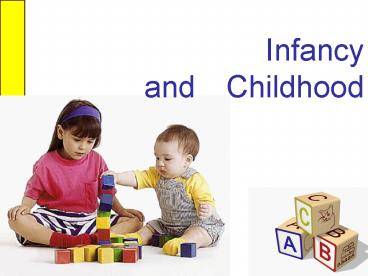Infancy and Childhood - PowerPoint PPT Presentation
1 / 22
Title:
Infancy and Childhood
Description:
... impact later life. Learn about developmental problems ... Developmental Norms: the age at which the average child achieves certain developmental milestones ... – PowerPoint PPT presentation
Number of Views:781
Avg rating:3.0/5.0
Title: Infancy and Childhood
1
Infancy and Childhood
2
Developmental Psychology
- Study how people grow change throughout life
- Focus on infancy childhood to
- Find out how childhood experiences impact later
life - Learn about developmental problems
- How to foster healthy adults
- Examine physical, social,
- cognitive development
3
Nature vs. Nurture
- Nature Heredity/biological
- Maturation- automatic sequential process of
development that results from genetic signals - Learning to crawl, walk, etc.
- Critical Periods- stage or point when a child is
best suited to - learn a skill or behavior
4
- Nurture
- Behavioral psychologists
- John Locke- Tabula Rasa
- John Watson- influence of environment, nutrition,
family situation, etc. - Says that development relies more on environment
than genetics
5
Stages vs. Continuity
- Stages
- Occurs in steps or specific phases based on
skills or behaviors - Continuity
- Development is a gradual process that happens
gradually
6
Physical Development
7
Motor Development
- Developmental Norms the age at which the average
child achieves certain developmental milestones - During early motor development, newborn reflexes
give way to voluntary actions - Maturation interacts with environmental factors
- promote changes in early
- motor skills
8
Motor Development
- Major milestones in motor development include
- Grasping
- Crawling
- Walking
- Pointing
- Hand-eye Coordination
9
Language Development
- 0-12 months Babbling- repetition of speech-like
sounds - 12-18 months First word usually uttered
- 18-20 months Holophrases- single words
10
- 20-24 months Telegraphic Speech- Two-word
sentences - 2-3 years Simple Sentences- simple sentences
which ignore minor parts of speech, etc. Usually
3-5 words - 3-4 years Kids begin to fill in sentences
- 4 years up Complex
- Sentences- 6 or more words including
- verb tenses and details
11
Language Theories
- 1) Reinforcement- Parents listen to infants
babbling and reinforce (reward) the infant for
making noises that sound like adult speech - 2) Critical Periods- Critical time for the
acquisition of language, and after that time it
will be - very difficult to acquire
- language
12
- 3) Chomskys Theory- Children are born with a
language acquisition device, an innate mechanism
that enables him to understand the rules of
grammar, makes sense of the speech they hear,
form intelligible sentences and that this is the
best time to teach another language
13
Social Development
- Interaction with others develops from beginning
of life - In animals, it is biological
- Baby ducks follow their mother because of a
natural phenomenon called imprinting - More complex in humans
14
- 0-2 years old
- Attachment Infants bond to primary caregiver
- Infants who are securely attached to their
mothers are better able to develop autonomy, a
sense of independence - 2 years
- Childs desire for autonomy conflicts with
parents need for peace order - Conflicts are necessary step in socialization
which teaches kids the behaviors attitudes
appropriate to their family culture - Parenting style affects childrens behavior
self-image
15
Social Interaction
16
Eriksons Stages of Psychosocial Development
- Looks at the development of ego identity the
conscious sense of self that is developed through
social interactions - In each stage, we encounter a conflict which
becomes a \\ - turning point, resulting
- in either personal growth
- or failure
17
- Stage 1- Trust vs. Mistrust
- 0-2 years old
- Most fundamental stage in life.
- Because an infant is so dependent, the
development of trust is based on the
dependability and quality of the childs
caregivers. - If a child successfully develops trust, he or she
will feel safe and secure in the world.
Caregivers who are inconsistent, emotionally
unavailable, or rejecting contribute to feelings
of mistrust in the children they care for.
Failure to develop trust will result in fear and
a belief that the world is inconsistent and
unpredictable.
18
- Stage 2 Autonomy vs. Shame
- 2-3 years
- children develop a greater sense of personal
control. - Toilet training is a vital part of this process
because learning to control ones body functions
leads to a feeling of control and a sense of
independence. - Other important events include gaining more
control over food choices, toy preferences, and
clothing selection. - Children who successfully complete this stage
feel secure and confident, while those who do not
are left with a sense of inadequacy and shame
19
- Stage 3 Initiative vs. Guilt
- 3-5 years
- During the preschool years, children begin to
assert their power and control over the world
through directing play and other social
interaction. - Children who are successful at this stage feel
capable and able to lead others. Those who fail
to acquire these skills are left with a sense of
guilt, self-doubt, and lack of initiative.
20
- Stage 4 Industry vs. Inferiority
- 6-12 years
- Through social interactions, children begin to
develop a sense of pride in their accomplishments
and abilities. - Children who are encouraged and commended by
parents and teachers develop a feeling of
competence and belief in their skills. Those who
receive little or no encouragement from parents,
teachers, or peers will doubt their ability to be
successful.
21
Kohlbergs Stages of moral development
- Studied how children learn morals and why they
think things are right or wrong - Believed people dont skip stages or go backward,
but children may advance at different rates - Not all people will reach
- level 6
22
(No Transcript)































